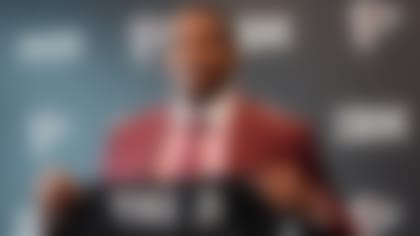The new league year arrived Wednesday with the frenetic free agency market finally slowing down to a crawl. Now that there's time to take a deep breath, let's look at some of the biggest questions remaining after a wild stretch of transactions.
1) What's next for the Chargers? There was a lot of speculation about how the Chargers would get in by Wednesday's deadline. They answered by cutting Mike Williams and restructuring Khalil Mack's contract, but Jim Harbaugh and general manager Joe Hortiz still have work to do.
I can't see Joey Bosa on this roster in 2024. His 2020 contract extension (for five years and $135 million) made sense at the time, but he's only played 523 snaps in the last two years combined, per Pro Football Focus. He's only topped 550 snaps in a season four times in his career, which makes his $15 million base salary this year too rich for this team. He's due a $7 million roster bonus on Friday () that he's unlikely to receive. A trade could be around the corner, freeing up some space for the Chargers to address other needs. So far, they've made a trio of mid-level signings, retaining safety Alohi Gilman and picking up tight end Will Dissly and running back Gus Edwards.
It's possible the team could bring Williams back, according to NFL Network Insider Ian Rapoport. The Chargers would figure to have competition for Williams. He's coming off a torn ACL, but there's no other available free agent like him in this market. I ranked him 12th among my Top 101 free agents, and he's the top receiver left, ahead of Marquise Brown.
2) How is the Calvin Ridley contract going to age? All week we heard that the Jaguars and Patriots were in a bidding war for Ridley, the top receiver to actually hit the free agent market. So of course it was the Titans who signed him for $50 million guaranteed on a four-year, $92 million contract.Ìý
Sticker shock on free agency contracts is generally overstated. The $18 million-per-season that the Jags gave to Christian Kirk two years ago looked like a lot at the time, but that has aged well enough. Every team needs at least two or three quality receivers, and it costs to acquire a veteran. With that said, Ridley's 2023 season -- marking his return to the NFL after being suspended for violating the league's gambling policy -- was erratic. He often wasn't where Trevor Lawrence expected him to be, and drops were a problem. A solid No. 2 or No. 3 receiver, Ridley fits a major need for the Titans opposite DeAndre Hopkins. They are giving Will Levis a better chance to succeed, but it's been a strange couple of days for Tennessee.
The Titans swapped centers, moving from Aaron Brewer (who got paid in Miami) to Lloyd Cushenberry. That's an upgrade, but it had better be, for $26 million guaranteed. They gave former Bengals cornerback Chidobe Awuzie big money (three years, $36 million, with $23 million guaranteed) after Awuzie had a rough season with the Bengals that included him losing snaps. They watched productive defensive players Azeez Al-Shaair and Denico Autry leave for the Texans, replacing Al-Shaair with another team's problem, former Chargers linebacker Kenneth Murray, a former first-round pick who did not play well enough to entice L.A. to pick up his fifth-year option. Tony Pollard is in place for Derrick Henry, amazingly receiving more reported guaranteed money ($10.49 million, according to ) than Henry was given from Baltimore ($9 million). Mason Rudolph was brought in on Wednesday to replace Ryan Tannehill as Levis' backup.Ìý
I don't hate all these moves, but general manager Ran Carthon paid a premium on almost all of them, especially Ridley. It felt like the Titans were a team with way too much cap space and not enough great players to spend it on. Drafting their own stars is Carthon's next mission.
3) What else are the Falcons going to do? Kirk Cousins is a big upgrade, even if he's the streakiest quarterback of his generation and coming off a torn Achilles tendon. Darnell Mooney is a terrific deep threat who was open in Chicago more than his numbers indicate. He's also one of two wide receivers now on Atlanta's roster who has caught an NFL pass in the past three years. Depth is lacking all over this team, and the Falcons don't currently have much cap space with which to add it.
It's been surprising to see new coach Raheem Morris leave the league's untouched so far. The defense needs edge pass rushing, like it has for the last decade. There's plenty of time for GM Terry Fontenot to bolster the roster before Week 1, but there are also more holes than is ideal, considering Fontenot is entering Year 4 on the job. The notion that Cousins is joining some ready-made roster is not accurate. He's just joining a bad division.
4) When will a Justin Fields trade happen now? The logical landing spots for the Chicago quarterback dried up fast, with nary an insider reporting on any serious trade talks happening. At this stage, I don't expect a deal until draft week or even Day 2 of the draft. Fields is most likely to be a backup plan for a team like the Patriots, Seahawks, Giants or Broncos, someone who goes bargain-shopping after finding out where the QB prospects fall on draft weekend.Ìý
The looming decision on Fields' 2025 fifth-year option could be scaring away teams who don't want to commit significant resources (either in money next year or draft resources) for a one-year rental. While I think acquiring Fields is a worthy gamble -- teams should keep taking swings at quarterbacks until they hit! -- the Bears probably aren't getting anything better than a mid-round pick at this stage.
5) Does Adam Peters have the magic touch? It's a new era in Washington. This is the first full offseason since owner Josh Harris took over the team, and Peters, the new GM, has been extremely active, alongside new coach Dan Quinn, in turning over the Washington roster to start free agency. The Commanders have targeted a surprising assortment of players: edge Dorance Armstrong, linebacker Frankie Luvu, linebacker Bobby Wagner, running back Austin Ekeler, center Tyler Biadasz, guard Nick Allegretti, quarterback Marcus Mariota, safety Jeremy Chinn, edge Clelin Ferrell and kicker Brandon McManus. I like some of the moves (Armstrong, Luvu, Chinn) better than others (Ekeler, Mariota, Ferrell), but I like the process best of all. Only Wagner, Mariota and McManus are above 30. The total guaranteed money on all these contracts combined is well under $100 million, . Â
This was a roster that badly needed depth and professionalism, and Peters appears to be looking for players who can contribute while the team searches for core pieces. It's a different type of splashy free agency from the one old Dan Snyder teams were known for, and it's more likely to be effective. Free agency is best used for finding role players and solid starters rather than overpaying in hopes of finding a star. ...
6) Will the Bengals actually trade Tee Higgins? The wide receiver market moved slower than the market at other positions in free agency, because there weren't many true difference-makers available. Higgins knows the Bengals are preventing him from making more money elsewhere by using the franchise tag on him, yet his trade request could fall on deaf ears.Ìý
Any team could sign Higgins to an offer sheet if it was willing to give up two first-round picks for Higgins, but that's not happening. The quality and depth of wideouts in this draft is working against Higgins. The Bengals have shown in the past they aren't afraid to hold on to a tagged player for one final year, like they did with safety Jessie Bates in 2022, wideout A.J. Green in 2020 and even defensive lineman Michael Johnson back in 2013. All three wound up leaving the Bengals after one final go-around. Joe Burrow is right that he's a championship window unto himself, but the Bengals know this particular opportunity, to have Burrow, Ja'Marr Chase and Higgins together, is only likely to last one more year. They'll want to use it, even if Higgins might be upset.











